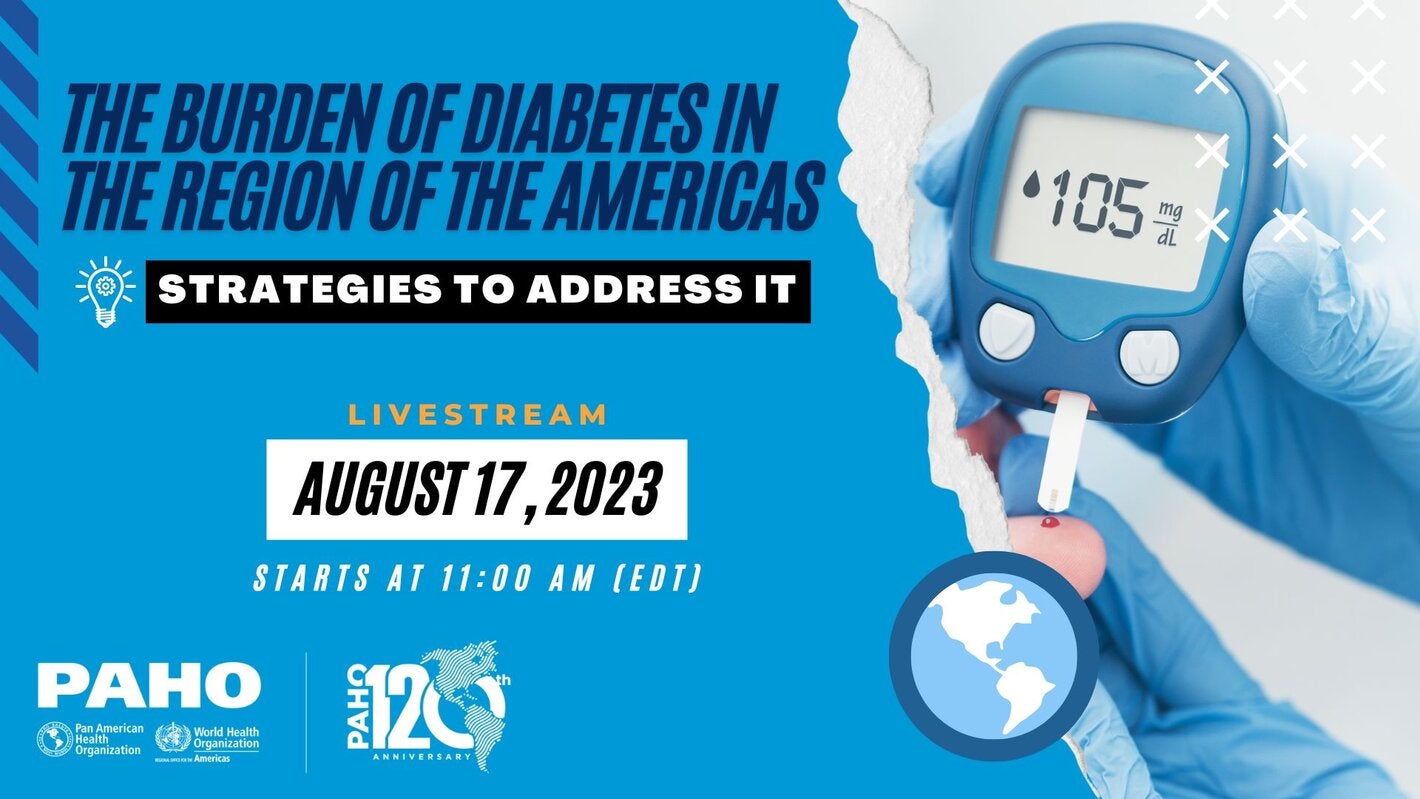
To provide evidence on the impact of diabetes on people's health and review the available strategies to deal with it, PAHO is organizing a virtual seminar for Thursday, August 17, 2023, from 11:00 a.m. to 1:00 p.m. to 12:30 p.m. (EDT). During this event, the country profiles of the burden of diabetes and diabetic kidney disease developed by the Department of Noncommunicable Diseases and Mental Health (NMH) of PAHO will be launched.
Country profiles - Burden of Diabetes Disease 2023
Webinar in it´s original language
Webinar with translation in English
Objectives of the event
- Highlight the impact of diabetes on people's health and the strategies available to deal with it.
- Present country profiles of the burden of diabetes and diabetic kidney disease for countries in the Region of the Americas.
- Highlight the relevance of the Global Diabetes Compact to achieve global diabetes prevention and control targets.
How to participate
- DATE: Thursday, August 17, 2023
- TIME: 11:00 AM (EDT)
- LANGUAGES: English, Spanish and Portuguese with simultaneous translation.
- REGISTER: https://paho-org.zoom.us/webinar/register/WN_wuBhKdvTQzOj2EtKk8Z1eg#/registration
Context
Over the past decades, the burden of diabetes has increased exponentially, particularly in low- and middle-income countries. The Region of the Americas tripled the number of people with diabetes in just 30 years, reaching 62 million. However, this number could be even higher since 40% of people are unaware of their disease.
As a demonstration of the commitment to establish and strengthen multisectoral national actions for the prevention and control of noncommunicable diseases (NCDs), including diabetes, Member States have agreed to various commitments and, most recently, adopted the 2023-2030 roadmap for the prevention and control of NCDs. In 2015, NCDs were also integrated into the 2030 Agenda for Sustainable Development. In 2021, the World Health Organization (WHO) launched the Global Diabetes Compact, created as an international initiative to improve diabetes prevention and care and thus contribute to the global target of reducing premature mortality from NCDs by one-third by 2030.
Agenda
|
11:00 a.m. |
Welcome remarks. Silvana Luciani. Unit Chief, Noncommunicable Diseases, Violence and Injury Prevention, Pan American Health Organization. |
|
11:10 a.m. |
Global Diabetes Compact and global perspectives. Dr. Bianca Hemmingsen. Medical Officer, Management of NCDs, World Health Organization. |
|
11:25 a.m. |
The burden of diabetes in the Region of the Americas and strategies for its prevention and control. Dr. Carmen Antini. Regional Advisor, Diabetes Prevention and Control, Pan American Health Organization. |
|
11:35 a.m. |
Diabetes and diabetic kidney disease: the perspective of those affected. Dr. Mark Barone. General Manager, Fórum Intersetorial para Combate às DCNTs no Brasil (FórumDCNTs). |
|
11:45 p.m. |
Interrelation between diabetes, hypertension, and kidney disease. Dr. Guillermo Alvarez. President, Latin American Society of Nephrology and Hypertension (SLANH). |
|
11:55 p.m. |
Social and psychological aspects related to diabetes and its complications. Clinical Psychol. Ana Fernanda Sánchez. Vice President of the International Diabetes Federation (IDF) |
|
12:05 p.m. |
Questions and answers |
|
12:20 p.m. |
Closing remarks Dr. Carmen Antini. Regional Advisor, Diabetes Prevention and Control, Pan American Health Organization. |
Time correspondance
- 8:00 am. – Vancouver, Los Angeles.
- 9:00 am. – Guatemala City, Mexico City, San Jose (CR), Tegucigalpa, San Salvador.
- 10:00 am. – Bogota, Panama, Kingston, Quito, Lima.
- 11:00 am. – Washington DC, Asuncion, Caracas, Havana, La Paz, Santiago de Chile, Santo Domingo, Ottawa, Puerto Príncipe, San Juan, Santo Domingo, Bridgetown, Nassau.
- 12:00 pm. – Buenos Aires, São Paulo, Montevideo, Brasilia, Paramaribo.
- 5:00 pm. – Geneva, Madrid.
For other cities, check the local time in the following link.
